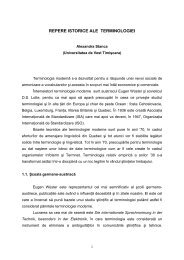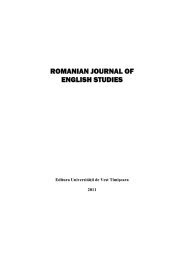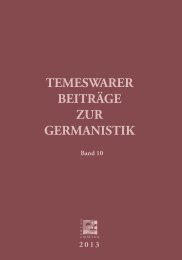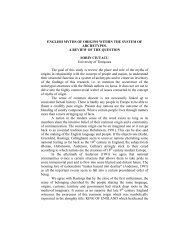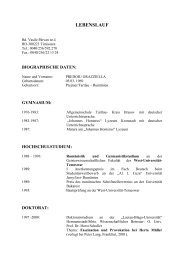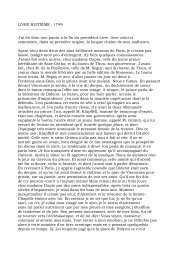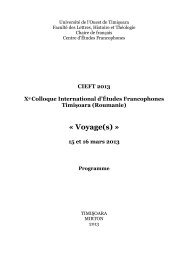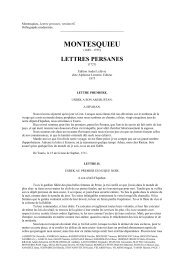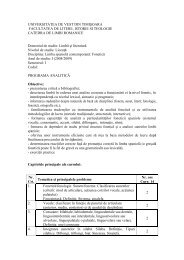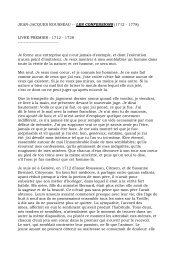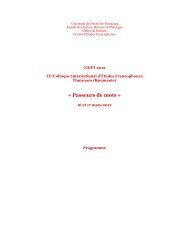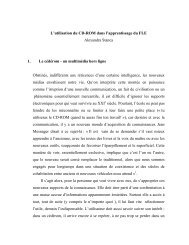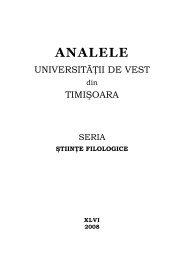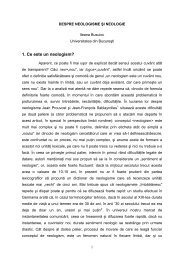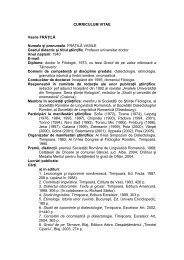TRANSLATION AND MEANING: A CULTURAL- COGNITIVE ...
TRANSLATION AND MEANING: A CULTURAL- COGNITIVE ...
TRANSLATION AND MEANING: A CULTURAL- COGNITIVE ...
Create successful ePaper yourself
Turn your PDF publications into a flip-book with our unique Google optimized e-Paper software.
2.3.1 Independent Clauses<br />
Of all the cases when compressed clauses are used with adjectival<br />
force, the largest number of instances is reserved for the independent<br />
clauses with propositional effect. Those are sentences with an overt<br />
subjective element, predicator and its complements. The initial capital letter<br />
is obligatory only if the subject is a proper name or in the form of the first<br />
person singular pronoun.<br />
Certain authors, as Déchaine and Wiltschko (2002:425), put forward<br />
the idea that the only compounds in English, and probably in other<br />
languages as well, which contain first and second person pronouns are PCs.<br />
This observation has been verified by the research results. What can be<br />
added is that the third person pronoun cannot be a part of these lexical<br />
items, in all likelihood due to its requirement in terms of verb inflection and<br />
which would have to be dropped: I-can-read books, you-know-who words,<br />
you-know-what manner, etc. The next group of these words, and not so<br />
prominent one, would be made of cases in which there occurs a proper<br />
subject-verb relationship of the declarative type, but the subject is not any of<br />
the personal pronouns. This is best explained by mentioning the idiomatic<br />
dog-eat-dog world case, so often used in language.<br />
Another very frequent manifestation of this model is moulding<br />
imperative sentences into lexemes by compacting the elements with or<br />
without an overt pronominal subject element, but with occasional adverbial<br />
modification included: a you-be-damned fellow, don’t-ask-me expression,<br />
etc. Also, the next words are occasionally made use of in the English<br />
language: catch-as-catch-can situation, just-see-who-I-am manner, knockme-down<br />
way, get-rich-quick policy, take-it-or-leave-it offer, walk-in-andask<br />
method, get-in-first preview.<br />
A separate, fourth group can be composed of all those lexicalizations<br />
where the clause which lies in the foundation of the string has the form of an<br />
exclamatory sentence, such as the one provided as an example in the OED<br />
and the research corpus:<br />
(8) G. Summer, No. 12/3, 1888 His hail-good-fellow-well-met shake of the hand.<br />
(9) ...would go off on another of his O-Jason-my-Jason-how-great-thou-art jags...<br />
(SKPS,525)<br />
In our research, the contribution of clause-based PCs of less than 1%<br />
of all APCs in the corpus was far less than expected in the stages prior to the<br />
analysis itself. Four samples of the corpus have the force of imperativeexclamatory<br />
sentences.<br />
(10) ...a glimpse of the old, go-to-hell Lilly Cavanaugh... (SKPS,4)



